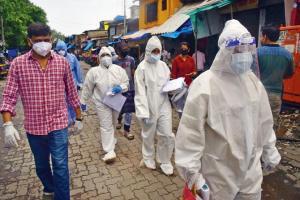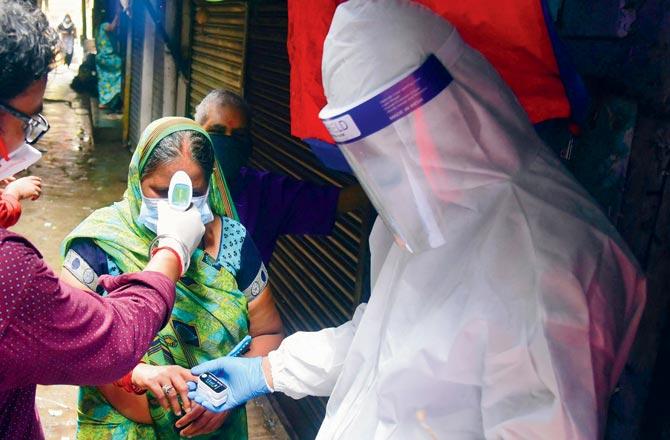suggests round one of sero-survey conducted in three wards; in high-rises, only 16 participants found with antibodies

Health workers screen people for the symptoms of novel Coronavirus at Khar Danda slum. File pics/Shadab Khan
Findings of the first round of sero-survey indicated that the spread of novel Coronavirus is significantly higher in the slums, where more than 50 per cent of the infected people developed antibodies, as compared to the residential areas.
ADVERTISEMENT
The BMC collected samples from 6,936 people of the R North (Dahisar), M West (Chembur) and F North (Matunga) wards, and tested them for the presence of the neutralising antibodies in the blood to determine whether they have been infected and recovered from COVID-19.
Antibodies more in women
According to the data, antibodies were present in 57 per cent of the participants from the slums, whereas only 16 per cent people from the residential areas were found to have antibodies. It also indicated that prevalence of antibodies was marginally higher in women than in men.

Additional Municipal Commissioner Suresh Kakani said the findings reflect a positive trend. "The 57 per cent of slum residents who tested positive for novel Coronavirus have developed the antibodies and won’t contract the virus again for at least two-three months. It shows that the virus resistance among people living in slums is better. People in residential buildings protected themselves through physical distancing, use of masks and maintaining hand hygiene," he said.
The survey report also stated that the infection fatality rate (the ratio of the number of deaths based on the actual number of people infected) of the city stands at below 0.10 per cent, which is much lower than the case fatality rate (ratio of the number of deaths based on number of confirmed cases) of around 5-6 per cent. The results suggested that the number of asymptomatic positive people is likely to be in higher proportions.
Also Read: Coronavirus outbreak: ICMR asks states to do sero-survey to measure COVID-19 exposure
T Cell response study needed
Civic officials hinted at the possibility of herd immunity in slum areas, however, COVID task force member Dr Shashank Joshi felt that the ratios, like IFR, are relative and referred to them as ‘biostatistical gimmicks’. "The sero-survey only tells us the status of the Immunoglobulin G antibodies. Antibody isn’t the same as immunity or herd immunity. COVID immunity is predominantly a T cell response while the antibody is a B cell response. So, we really need to study the T Cell response to understand whether there is an appropriate immunity," he said.
Pointing to certain positive outcomes of the survey, Dr Joshi said, "It tells us that a large population was exposed and was possibly infected. Many of them were asymptomatic and have recovered. Now, there needs to be a comparison between the number of actual deaths, actual infections and the actual population of the area," he said. "The mortality rate is currently around 4 per cent and our aim is to bring it down to under 1 per cent."
Second round in Aug
The municipal corporation had aimed at 10,000 samples in the first round, but could collect only close to 7,000 as heavy rain caused hindrance, a civic official from the health department said. "We had a specific deadline to work with. Collection was affected by heavy rain and the response from the slum areas was sluggish. We will try to get a similar number of samples for the second round."
The second round of the survey is expected to begin in the second week of August.
6,936
No. of people who took part in the first round of survey
Catch up on all the latest Mumbai news, crime news, current affairs, and a complete guide from food to things to do and events across Mumbai. Also download the new mid-day Android and iOS apps to get latest updates.
Mid-Day is now on Telegram. Click here to join our channel (@middayinfomedialtd) and stay updated with the latest news
 Subscribe today by clicking the link and stay updated with the latest news!" Click here!
Subscribe today by clicking the link and stay updated with the latest news!" Click here!






